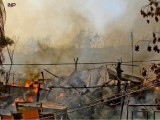Violence in Rio slums, failed bid to end it, depicted in new movie
RIO: In an alley of the only Rio slum where shootouts are not people’s daily bread, a cop and a drug dealer chat and joke around.
But then a movie director shouts ‘action!’ and the scene reverberates and lights up with the gunshots and muzzle flashes of what life in the so-called favelas is truly like for its residents.
Thus goes the filming of a yet-to-be-titled movie that aims to depict one of the main dramas of Rio de Janeiro: the failure of a novel plan to bring peace to the poor, drug-infested and gang-ruled favelas with a new law enforcement policy that began about a decade ago.
The favela chosen for the movie, Tavares Bastos, now has a headquarters of special forces of the feared military police overlooking it from a hill.
So there are no daily gun battles here, nor do you see drug traffickers walking around with assault rifles, nor kids killed by stray bullets, as is common in other teeming slums in Rio.
Nearly 100 Rio police targeted in corruption crackdown
“Only in this favela could we film without reaching some kind of agreement with the drug traffickers or para-police militia. If we did not do it here, we would have to film everything in a studio,” said the film’s director, Caio Cobra.
All the trappings of a movie shoot–lights, cameras, and legions of production people–don’t even bother people in this favela. They are used to being portrayed in film and on TV.
Cesar Machado, a 66-year-old man living in Tavares Bastos, says that whenever people talk about the dire state of these communities and their rampant violence, they never go to what he considers the source: politicians in the capital Brasilia who neglect the poor.
“They only talk about the final product, which is us,” said Machado as he left a bakery.
The screenplay was written by Rodrigo Pimentel, a former military police special forces member, and addresses the collapse of the community policing units, which had the acronym UPP, or Police Pacification Units.
These were deployed in 2008 amid a wave of optimism and expectation as Brazil, preparing to host the World Cup in 2014 and the Summer Olympics in 2016, wanted to clean up the favelas.
But the special units eventually collapsed, as the government did not make them a priority or earmark sufficient resources, neither for the units themselves nor for other promised social and education programs. The units were also hit by corruption cases.
The movie tells its story through the eyes of police officers.
The main character is a young female police officer who firmly believes in the community policing project as a way to rid the favelas of violence.
But her dreams are crushed by a city engulfed in economic crisis and corruption scandals.
“This movie talks about today’s Rio, after all that excitement over the World Cup and the Olympic Games,” said Pimentel.
“Every day, the newspapers carry stories about favela residents being shot, about slain police. I thought it was very necessary, urgent even, that Brazilian cinema tells the story of those people.”
Five police officers acted as advisors to the film team and some even have small parts in the movie.
“Police are also victims of violence, and their version of events was almost always treated with disdain, hidden by Brazilian cinema,” Pimentel told AFP.
Six family members butchered in Rio: police
Addressing this theme is a delicate task: the state of Rio has a horrifying murder rate–nearly 6,500 last year–while police lack resources to fight well-armed organised crime gangs and are paid little.
Police in Rio are the most likely in Brazil to be killed in the line of duty –but also the ones most commonly involved in deadly shootings.
In 2017, more than 130 officers died on the job, and this year the figure so far is 60.
Meanwhile, some 1,150 people died in police shootings last year, according to the state’s Public Security Institute.
So with tensions so high, how will the city react to this movie? The people behind it insist it will be balanced.
“The movie does not take sides. It is not propaganda-oriented. It exposes an open wound and lets the viewer decide,” said actor Marcos Palmeira, who plays the commander of a community policing unit.
Human Rights ministry presents findings on out of school children at third meeting of Islamabad Forum
Police, family members suspect husband’s involvement
As many as 150 huts gutted in fire
More in World
Original news : https://tribune.com.pk/story/1762354/3-violence-rio-slums-failed-bid-end-depicted-new-movie/

